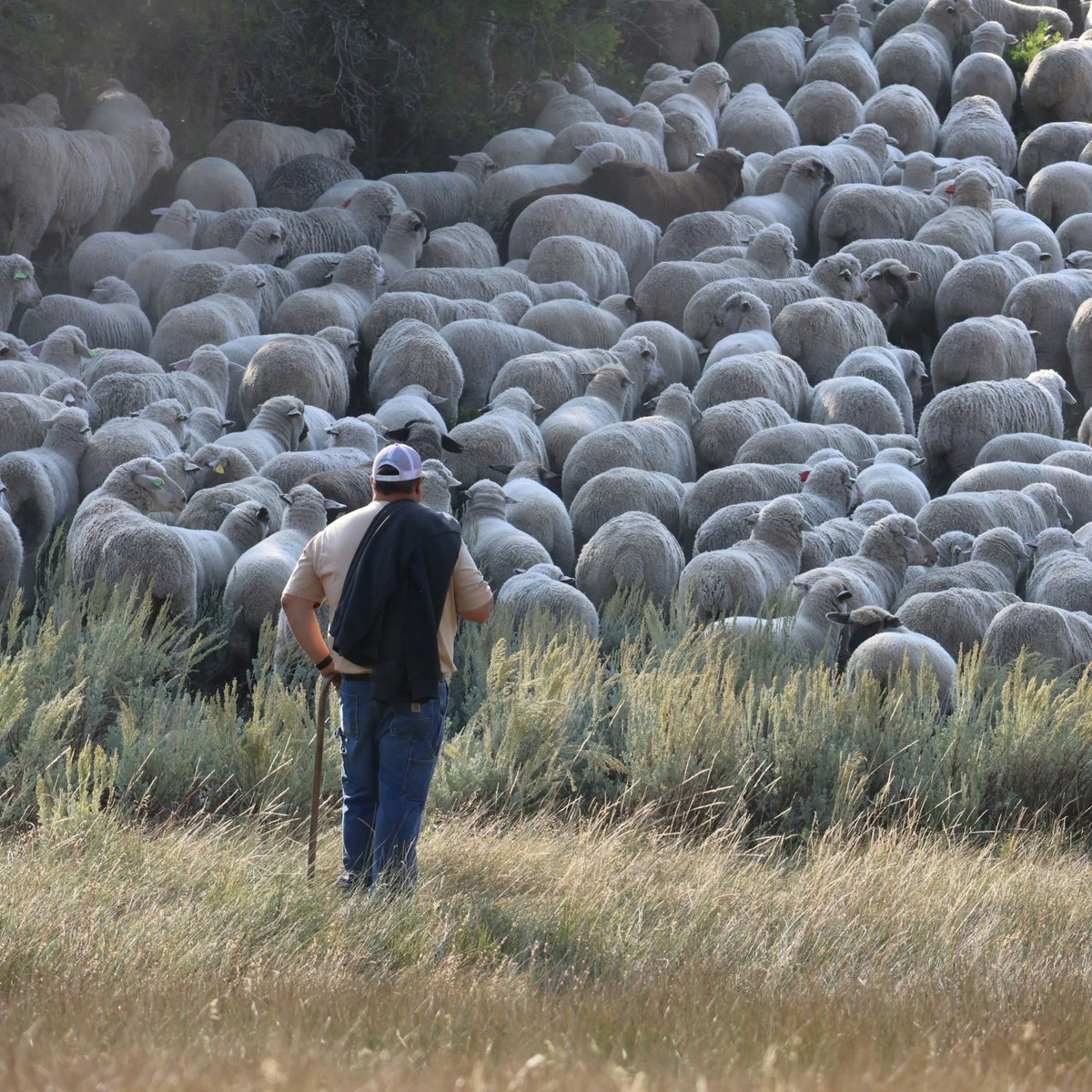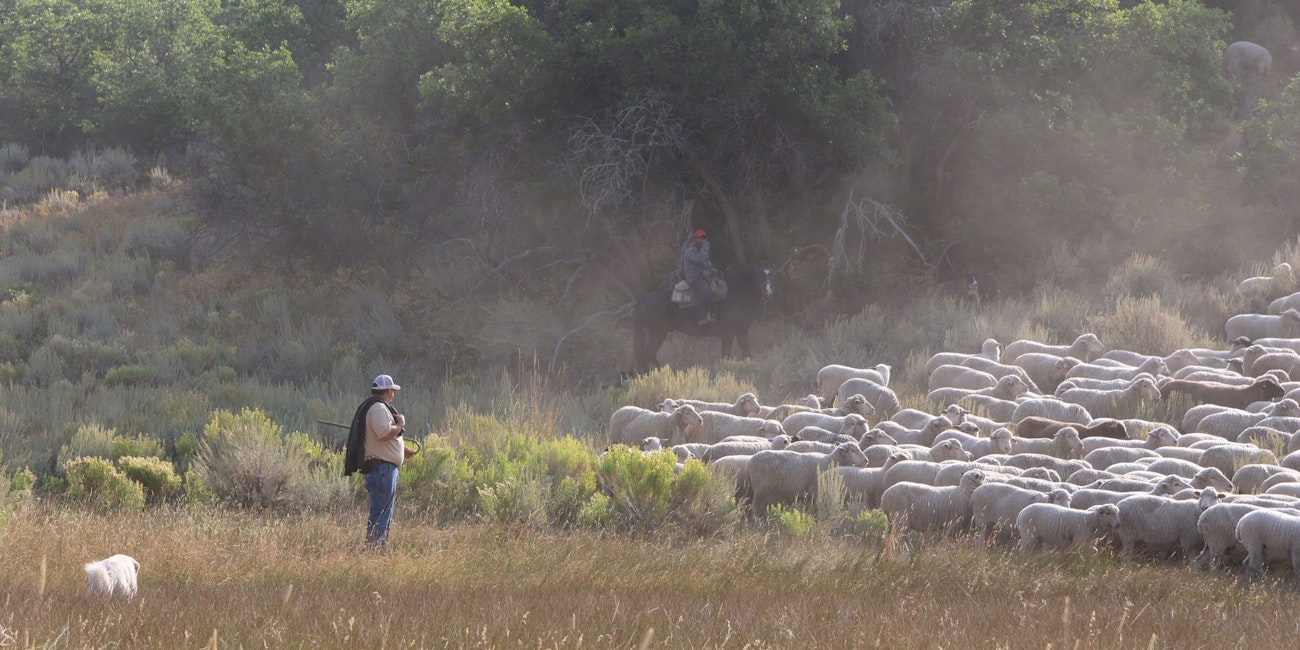https://farmfiberknits.com/cdn-cgi/image/format=auto/https://www.datocms-assets.com/101500/1699312755-4-ewes-header.jpg?auto=format&w=900
Developed in response to public outcry surrounding graphic videos of animal cruelty captured by PETA in South America, the Texas-based Textile Exchange created the Responsible Wool Standard (RWS) to nudge ranchers worldwide toward more humane, better-for-the-environment practices and give brands a semaphore for mindful sourcing.
Developed over the course of years with the help of animal welfare organizations, farmers, brands and suppliers, the Responsible Wool Standard (RWS) is a rigorous global certification that requires growers to adhere to 270 criteria regarding animal welfare, land health and social responsibility while also mandating documentation and annual third-party, in-person audits.
“It’s not subject to greenwashing,” Mary Jeanne Packer of Battenkill Fibers said of her decision to develop a sock yarn sourced from RWS-certified American fiber. “There are a lot of other branding systems that are subjective. RWS is verifiable.”
 Theos Swallow Fork Ranch in Meeker, Colorado, is one of the family ranches that have become RWS-certified and joined Shaniko Wool Company. Photo courtesy of Shaniko Wool Company
Theos Swallow Fork Ranch in Meeker, Colorado, is one of the family ranches that have become RWS-certified and joined Shaniko Wool Company. Photo courtesy of Shaniko Wool Company
[PAYWALL]
Tracing Quality Wool to the Source
Though 756 farms globally have obtained certification since the standard launched in 2016, only one farm group in the United States has gone to the trouble and expense to embrace the RWS, along with the Nativa-Regen certification, which focuses on supporting regenerative farming practices. Shaniko Wool Company now aggregates fine wool from 10 Western family ranches under the Shaniko umbrella.
For busy ranchers trying to survive in the rough landscape of the American sheep industry, RWS certification, which is costly to pursue in time and money, is a challenging sell. To ease the financial burden of certification, Shaniko Wool founder Jeanne Carver pays certification fees for participating ranches, helps them with RWS protocols, and conducts annual internal audits in preparation for RWS third-party visits.
“Jeanne made things a lot simpler for us,” explained Anthony Theos, who’s been moving sheep to a new camp near Meeker, Colorado. “To go out and do it on your own would be more difficult.”
A fourth-generation sheep rancher, Theos runs the Theos Swallow Fork Ranch in northwestern Colorado, which was founded by his great-grandfather, a Greek immigrant. Through dint of hard work and savvy investing, the elder Theos established the ranch and grazing permits that enable his descendants to trail bands of sheep annually from winter range to private land for lambing, then up to summer range to feed during warmer months.
As the pandemic took hold, strangling global supply chains, it became almost impossible for growers of fine wool like the Theos family to sell their clip. Already frustrated by price gaps between what their fine wool commanded in the market compared to Australian fiber, the family decided to sell their wool differently. Familiar with how the Global Animal Partnership animal welfare certification had opened Whole Foods as a customer, they decided to pursue RWS certification and sell their award-winning merino to Shaniko Wool Company.
The move has paid off. Since joining the Shaniko Wool farm group, the Theos Swallow Fork Ranch has garnered an additional 20 percent premium on their fiber, matching prices down under—and taken pride in the fact that Shaniko Wool was used to make uniforms for the 2022 Winter Olympics athletes.
“Before this, I couldn’t tell you where our wool went,” he said. “It might have been used for military uniforms, but a lot of it probably went overseas. To have your whole end product domestically used in the United States, it’s a cool story, and when you know Olympic athletes are wearing your wool, that’s pretty special.”
 As part of achieving RWS certification, ranches such as Theos Swallow Fork Ranch demonstrate that their operations meet environmental, worker treatment, and animal welfare standards. Photo courtesy of Shaniko Wool Company
As part of achieving RWS certification, ranches such as Theos Swallow Fork Ranch demonstrate that their operations meet environmental, worker treatment, and animal welfare standards. Photo courtesy of Shaniko Wool Company
Knit RWS-certified American Yarn
For companies interested in reducing their carbon footprints and shoring up domestic supply chains, Shaniko Wool brings a half million pounds of American RWS-certified wool annually to the market, the first time ever this much high-quality, traceable, certified domestic wool has been available to American manufacturers and brands. Now that a reliable source of this wool is available, small manufacturers and brands are beginning jump in.
Meridian Mill House
For the Meridian Specialty Group’s craft yarn business, the pandemic represented a watershed. A long-time producer of acrylic yarn for big box retailers, the company could no longer compete with imported products.
So instead of chasing volume sales on the budget end, Meridian leaned into their American roots. The company began sourcing Shaniko Wool and other U.S. fibers to produce luxury wholesale products for yarn shops and independent dyers. As part of this move, Meridian also pursued mill certification under the RWS standard in 2022.
“We wanted wool and wool blends, something that was different and meaningful,” explained Stephen Hudson, senior vice president of Meridian Specialty Yarn Group. “We really felt the Shaniko story was something special.”
In 2021, Meridian introduced Meridian Mill House yarns with 12 products, including yarn made from RWS-certified Shaniko Wool, a range that has grown to 50 bases. All of these yarns are spun in the historic mill town of Ranlo, North Carolina, at a mill surrounded by the original houses where workers used to live.
KnitPicks’ High Desert
That same year, as the pandemic wore on and international shipping rates skyrocketed, online yarn purveyor KnitPicks sought a supply chain closer to home.
“It was a wild time for the purchasing and shipping industry,” observed Alexis Wilson, KnitPicks’ brand director. “The pandemic definitely lit the fire. It was something we wanted to do and was the motivator to make an actual [U.S.] product.”
They called the new line High Desert. Spun at Meridian from Shaniko Wool, with full traceability from ranches in the American West to KnitPicks’ warehouse, High Desert had Shaniko Wool’s strong back story buttressing it. (The company is pursuing RWS certification for its warehouse so they can use the RWS label.)
“We want to be accessible no matter what a customer’s budget level,” explained Wilson of KnitPicks’ decision to offer High Desert. “We wanted to provide a high quality yarn, a U.S. yarn, that was amazing and still affordable for a customer. It was like a dream come true, it’s amazing and beautifully constructed.”
American Ewe
CeCe Tkaczyk is the owner of CeCe’s Wool Yarns and More in Guilderland, New York, and a former New York state senator. CeCe and her dyeing partner, Kelly Shultes, have joined the herd of retailers who are sourcing Shaniko yarn from Meridian for a new yarn line they called American Ewe. The yarn was launched to consumers at the New York Sheep and Wool Festival in 2022 and to other yarn shops at the h+h Americas trade show in June of 2023.
“This is brilliant,” she said about being able to link into the supply chain at the mill stage. “This will help people who are trying to use American-sourced fiber in their dyeing pots. This started us off.”
StevenBe, who has an eponymous yarn shop in Minneapolis, is also sourcing Shaniko Wool yarn from Meridian for a new all-American line he hopes to launch in the fall. In the aftermath of the pandemic and with weather anomalies putting climate change top of mind, he sees sustainability as an increasingly important trend for the yarn industry.
“The world has changed,” he said, “and the climate is changing. We need to be aware.”
From ranch to retail
Raising the standard for wool production stretches from knitting yarn to finished products. DeFeet, a boutique manufacturer of cycling socks in North Carolina, is hoping to light a fire under the feet of the outdoor industry with the release of the first all-U.S.-made, traceable, ranch-to-retail, RWS-certified mass market product.
A former pro cyclist and DeFeet partner, Paul Willerton has been advocating for wool in their products since he came on board in the early 1990s and now is looking to elevate DeFeet’s sustainable wool story to the highest possible level. With its dual Nativa Regen-RWS certification, Shaniko Wool checked that box. DeFeet makes their Wooleator Pro and Woolie Bullie socks from Shaniko Wool.
“I wanted to do it, because I had a bit of chip on my shoulder,” said Willerton. Annoyed by having DeFeet socks turned away by some of the world’s most environmentally responsible retailers, he wanted to create an unimpeachable product that raised the bar on sustainability. Given that most outdoor manufacturers source wool from faraway New Zealand, Willerton has thrown down a carbon-footprint gauntlet in the shape of cycling and lifestyle socks. “If they deny us now,” he said, “it’s not about bringing the most environmental products to market, it’s about something else.” It’s also a challenge to other American brands that tout their green cred but purchase wool offshore.
“As we’ve increased population and become industrialized, we’ve broken down our regional models of clothing and feeding ourselves,” Jeanne Carver said. “Because we’re disconnected from that regional mode, we’re not motivated to be stewards; we consume and waste in general. What we’ve been doing is connecting people to the source of their fiber and the importance of this work.”
Leslie Petrovski is a freelance writer who lives in Denver, Colorado, in a 110-year-old house with her husband, obstreperous dog, and cat. She is an avid knitter, middling crocheter, and lousy spinner, who adores stories about U.S. fiber.
 Theos Swallow Fork Ranch in Meeker, Colorado, is one of the family ranches that have become RWS-certified and joined Shaniko Wool Company. Photo courtesy of Shaniko Wool Company
Theos Swallow Fork Ranch in Meeker, Colorado, is one of the family ranches that have become RWS-certified and joined Shaniko Wool Company. Photo courtesy of Shaniko Wool Company

 As part of achieving RWS certification, ranches such as Theos Swallow Fork Ranch demonstrate that their operations meet environmental, worker treatment, and animal welfare standards. Photo courtesy of Shaniko Wool Company
As part of achieving RWS certification, ranches such as Theos Swallow Fork Ranch demonstrate that their operations meet environmental, worker treatment, and animal welfare standards. Photo courtesy of Shaniko Wool Company